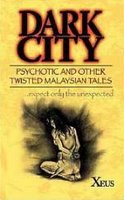 The author of the recently published Dark City (you may have seen it being displayed prominently in bookstores), Xeus AKA Lynette Kwan, has set up a blog. The first post (also published in today's edition of The Star) is an insightful look into her attempts at researching for her stories.
The author of the recently published Dark City (you may have seen it being displayed prominently in bookstores), Xeus AKA Lynette Kwan, has set up a blog. The first post (also published in today's edition of The Star) is an insightful look into her attempts at researching for her stories.Lynette shares with us some funny anecdotes, like this:
“How do you kill someone with cyanide?” I asked a doctor friend.And this:
He looked suitably alarmed. “Why, do you want to kill someone with cyanide?”
Still more suspect is my insistence on visiting the back alleys of red light districts, where ladies of questionable virtue prowl and call out to customers in droves.There is also some cool trivia you may not have known about Malaysian prisons. It's a great start for a blog, and I hope Lynette keeps up the good work and posts constantly.
“Come on,” I urged my doctor friend. “Let’s go talk to them. You can make like a customer and I’ll take down notes.”
Thanks so much for the great post and link, Ted! I will read through your story carefully and give my constructive thoughts. Don't worry, I'm a really very encouraging person.
ReplyDeleteYou're welcome! And, no, I'm not really worried, I've been battered by so much criticism, I've developed a thick hide. :D
ReplyDeleteOkay, I have read it twice. You have a natural flow for words and style. Writing comes easy to you.
ReplyDeleteThe major thing that holds you back, I suspect, from letting your full potential flow is your subject matter. You need to make your stories more exciting. Something has to happen, especially in a short story, or the reader will feel 'cheated' in the end. So your denouement has to be really 'I didn't see that coming' exciting.
Something has to happen to Suresh, or to the protagonist. And start with the most exciting bit.
I'm one of those in the school of letting dialogue English be 'English' as well, because too much Malaysianized English detracts from the flow of the story, and the story is the point of why the reader is reading it. In a short story, dialogue is a means to propel the story forward, and not to slow it down.
And in a 'literary' story, there has to be hidden meanings. Like what does the Water Tower represent? (See the 'Ice Palace' by Scott Fitzgerald.) And your sentences should have more similies and metaphors, like Fitzgerald or Margaret Atwood. (Unless you're in Hemingway's school...and I don't really like Hemingway.)
Good effort! Don't stop writing.
Thank you for your critique. I shall keep in mind your comments when I write.
ReplyDeleteI agree with dialogue being English as well actually, but I was experimenting whether I could make dialect work... I think I failed... My later stories all have their characters talk proper English.
As for metaphors and symbolic meaning... well, I'm working on that.